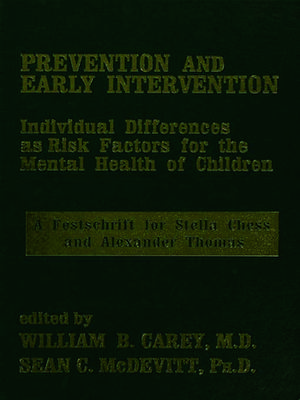Prevention And Early Intervention
Autor William B. Carey, Sean C. McDeviten Limba Engleză Hardback – 1994
| Toate formatele și edițiile | Preț | Express |
|---|---|---|
| Paperback (1) | 402.40 lei 6-8 săpt. | |
| Taylor & Francis – 23 iun 2015 | 402.40 lei 6-8 săpt. | |
| Hardback (1) | 914.71 lei 6-8 săpt. | |
| Taylor & Francis – 1994 | 914.71 lei 6-8 săpt. |
Preț: 914.71 lei
Preț vechi: 962.85 lei
-5% Nou
Puncte Express: 1372
Preț estimativ în valută:
175.05€ • 180.84$ • 145.69£
175.05€ • 180.84$ • 145.69£
Carte tipărită la comandă
Livrare economică 25 martie-08 aprilie
Preluare comenzi: 021 569.72.76
Specificații
ISBN-13: 9780876307236
ISBN-10: 0876307233
Pagini: 328
Ilustrații: black & white illustrations
Dimensiuni: 152 x 229 x 19 mm
Greutate: 0.66 kg
Ediția:1
Editura: Taylor & Francis
Colecția Routledge
Locul publicării:Oxford, United Kingdom
ISBN-10: 0876307233
Pagini: 328
Ilustrații: black & white illustrations
Dimensiuni: 152 x 229 x 19 mm
Greutate: 0.66 kg
Ediția:1
Editura: Taylor & Francis
Colecția Routledge
Locul publicării:Oxford, United Kingdom
Public țintă
Professional Practice & DevelopmentNotă biografică
William B. Carey, Sean C. McDevit
Cuprins
Part i introduction; 1: Introduction; 2: Biographical sketch of alexander thomas and stella chess; Part ii individual differences as risk factors: temperament; 3: Temperament: changing concepts and implications; 4: Inhibited and uninhibited temperaments; 5: Temperament risk factors for type a behavior pattern in adolescents; 6: Temperament, siblings, and the development of relationships; 7: Is temperament an important contributor to schooling outcomes in elementary school? modeling effects of temperament and scholastic ability on academic achievement; 8: Temperament research and practical implications for clinicians; Part iii individual differences as risk factors: development, birth weight, and chronic illness; 9: Variations, deviations, risks, and uncertainties in human development; 10: Conditions of risk for maldevelopment: prematurity; 11: Chronic illness as a psychological risk factor in children; Part iv environmental settings and their interactions with individual differences; 12: Temperament and the developmental niche; 13: Kids in context: temperament in cross-cultural perspective; 14: Temperament and cultural diversity; 15: Variations in cultural influences in hawaii; Part v goodness of fit: theoretical issues; 16: Explorations of the goodness-of-fit model in early adolescence; 17: Genetics and individual differences: how chess and thomas shaped developmental thought; 18 interface of nature and nurture in the family; Part vi issues in assessment of individual differences; 19 Assessment of individual differences in the temperament of children: evaluation of interactions; Part vii prevention and intervention strategies in the medical setting; 20: Specific prevention and intervention strategies used to accommodate individual needs of newborn infants; 21 specific uses of temperament data in pediatric behavioral interventions; 22: Developing temperament guidance programs within pediatric practice; Part viii prevention and intervention strategies in the day care and school setting; 23: Seeing the child in child care: day care, individual differences, and social policy; 24: Temperament and teachers' views of teachability; Part ix prevention and intervention strategies in the community setting; 25: The temperament program: community-based prevention of behavior disorders in children; 26: Parent support groups; Part x conclusions; 27: Advocacy for the health of the public; 28: Summary and conclusions: a promising opportunity for better prevention and intervention























